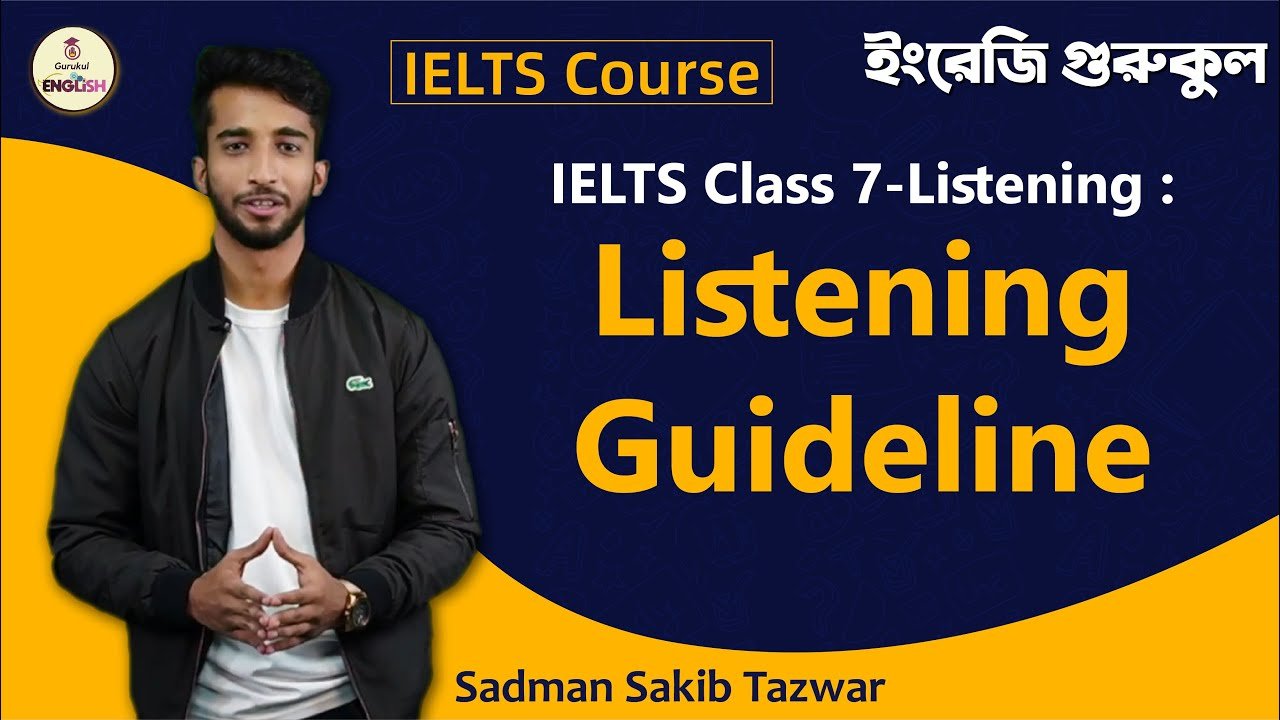Listening Guideline class is a part of our “IELTS Course”. This is the 7th class of our “IELTS Course”. Our “IELTS Course” will help you in your IELTS preparation. Prepare for the IELTS exam online at your own pace, Our “IELTS Courses” will help you get the score you need. This class has been made to help you in your IELTS examination.
Listening Guideline
Differences between hearing and listening
Hearing is simply the physical act of sound waves entering our ears and being transported to our brains. This is a passive process that requires no effort. No meaning is attached. If your ears work and you are in a place where sound is being transmitted, you will hear it. Listening is an active skill. It requires effort, and you can choose not to do it. Listeners take sounds and attach meanings to them. If they comprehend what a speaker has said, they can interpret and respond to the message. This is called active listening.

What to listen to
If you have Internet and a device (computer, tablet, phone) with sound, you will never run out of English listening material. Here are some suggestions for finding appropriate materials. If the listening level is too high and you don’t understand anything, find something easier.
Podcasts: Podcasts offer regularly updated episodes of listening bites. These shows may be short or long. They may be formal or informal. They are often organized around a certain topic. Podcasts are typically free. You can find many that are specifically made for language learners. You don’t need an iPod to listen to podcasts. You can often listen to podcasts online. If you have a mobile device or MP3 player you can also subscribe to podcasts and listen to them on the go. EnglishClub has a podcast that you can subscribe to.
Online listening labs and sites: Many websites like EnglishClub offer free listening activities. Some are organized by topic or level. You can also search EnglishClub’s links to find sites that offer free audio. Or use the search terms “free audio practice” or “free English listening”.

News: Many English news sites offer audio or video clips to go with news stories. If English is too difficult for you, find a site that offers news in easy English, such as EnglishClub’s monthly news or other sites that specialize in news reports for English learners.
Music: Listening to music lyrics is a great way to practice your active listening. At times you will have to replay one line over and over until you can understand what the singer is saying. Many lyrics are available online so you can read along as you listen. You can also search for music videos that have subtitles.
Videos/Film/TV: Find a topic you are interested in and start watching videos. You can watch English cartoons, how-to videos, documentaries or movies. Why not watch one each day? Some videos offer captions. You could also buy a TV series on DVD so that you can control when to pause, stop, and replay certain scenes.
Dictations: Improve your spelling, writing and typing skills as you practice listening. Dictations can also help you learn new vocabulary in context. EnglishClub offers dictations for different levels. You could also practice dictations with a partner. Choose readings at an appropriate level and practice reading slowly with proper pronunciation.
Conversations: If you are in an English-speaking country, instead of text in your own language on the bus or train, fold your hands in your lap and listen to the conversations around you. You can also sit in a coffee shop or restaurant and practice listening to strangers around you. This is called eavesdropping. Stare out a window or pretend to read a book so that others don’t feel uncomfortable. This is the one time not to make eye contact.

Details about Listening Guideline – English Grammar :
